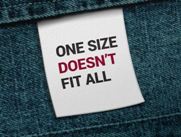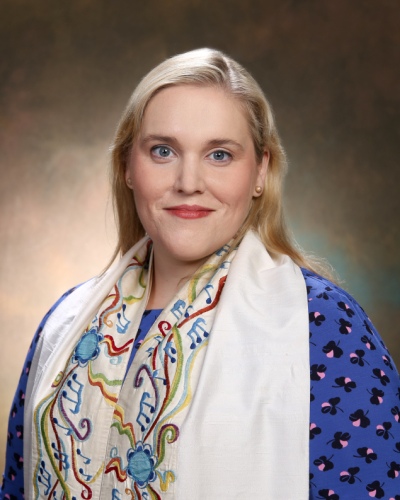This morning, a voice on my radio said, “Just remember, one-size-fits-all really means one-size-fits-none.”
This is the truth.
If one-size-fits-all is supposed to mean, “one-size-will-sufficienty-cover-you-while-making-you-look-absolutely-atrocious,” then maybe, or “one-size-fits-AWKWARD!” (I’m reminded of my friend and TBE’s former Director of Youth Engagement Andy Harkavy rocking out a one-size-fits-all Clifford costume… If you were there, you remember too.)
Then, there is the even more horrifying “one-size-fits-most.” What if it doesn’t fit you? Now, you are immediately marginalized to a corner of the population that is other to “most”. I will tell you, “most” people are not too eager to be on the outside of “most”.
In this week’s Torah portion, Pinchas, five sisters argue before Moses and Eleazar for their right to inherit property along side all of the other descendants of the Children of Israel who wandered the desert. They ask, “why should our father’s name be eliminated from his family because he had no son? Give us a portion along with our father’s brothers.” (Num 27:4) Moses brings their petition before God and God decrees that for all time, daughters should inherit property if there is no son in a family. In its time, this was an absolutely radical ruling: women without brothers would stand to inherit their father’s property before their male relatives. (In the scheme of our modern sense of justice and inheritance, the ruling may seem meager, but in its context, it is trail-blazing.)
These sisters: Machlah, Noah, Choglah, Milcah, and Tirzah – are brave enough to speak to the most powerful men in their community to ensure that the law for all time “fits” them in their unique circumstances.
One-size-fits-all simply cannot be, because in the compromise of trying to create something for everyone, you give up the contours, curves, and details that make something beautiful. Or, even worse, when the one-size-fits-all isn’t just masking a person or community’s highest self – but it is so ill-fitting as to create oppression or different classes of experience.
As Jews, we must always concern ourselves with “fit”. The word “kosher” means “fit” – that something is suitable for consumption. We are called to evaluate fit-ness wherever we are and in all aspects of our lives. These women remind us that when one-size-fits-all is offered, we must argue for customization and tailoring to ensure that each in our community is served.
We must keep our eyes open for things in our worlds that are simply not kosher – from the personal to the national – and work to make them better. We each have the power to be agents of change in ways big and small our lives. When our eyes are open to all of the things that might be better in our world, we then have to exercise the discernment to choose which battles we fight with our own hands, which fight through the support of individuals and organizations working for change, and those in which we choose not to engage.
One size never fits all. May we each be the seamstresses of our own best lives, the tailors of a most just world.




